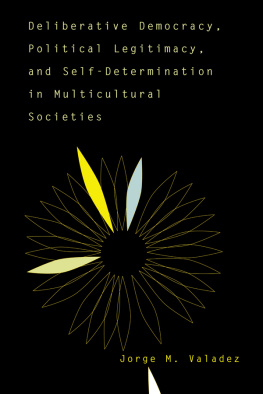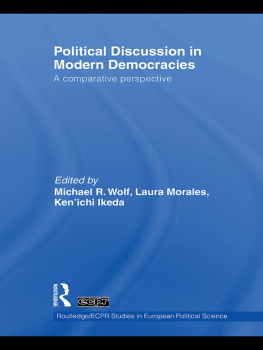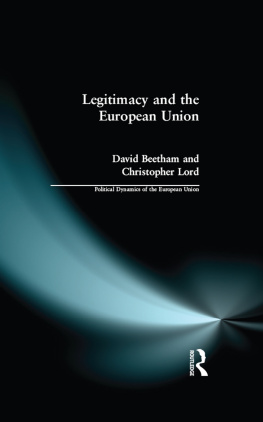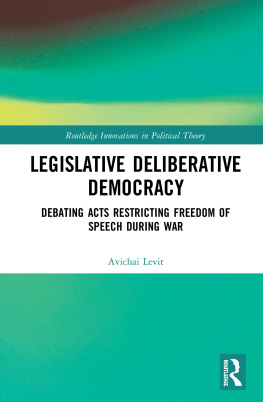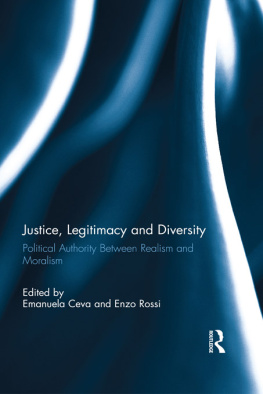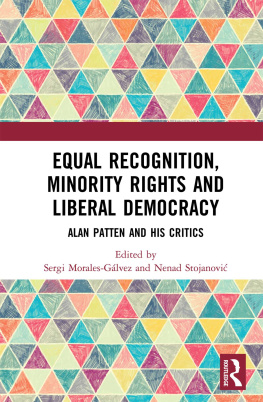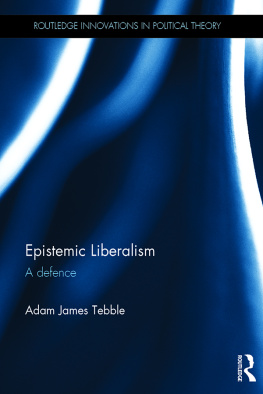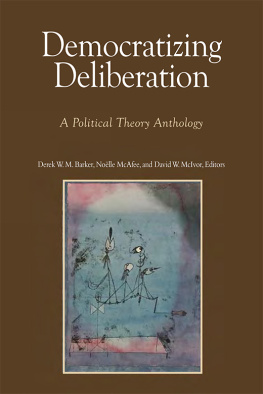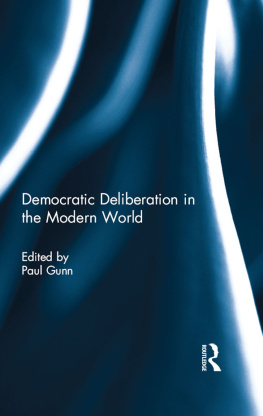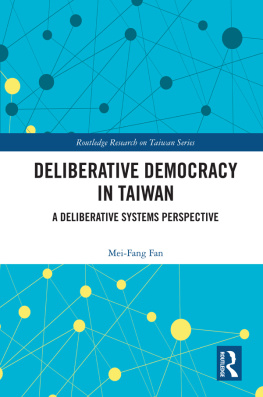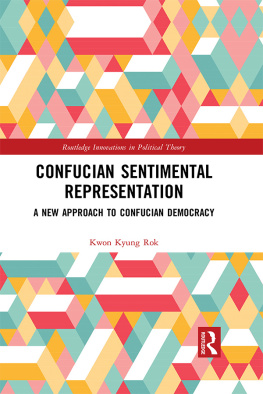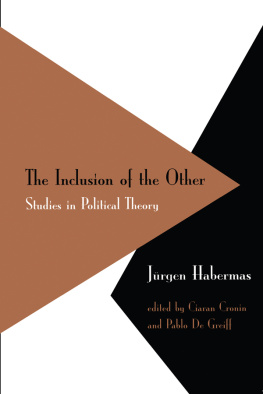Deliberative Democracy, Political Legitimacy, and Self-Determination in Multicultural Societies
To the memory of my mother and father,
Antonia and Manuel Valadez.
First published 2001 by Westview Press
Published 2018 by Routledge
711 Third Avenue, New York, NY 10017, USA
2 Park Square, Milton Park, Abingdon, Oxon 0X14 4RN
Routledge is an imprint of the Taylor & Francis Group, an informa business
Copyright 2001 by Taylor & Francis
All rights reserved. No part of this book may be reprinted or reproduced or utilised in any form or by any electronic, mechanical, or other means, now known or hereafter invented, including photocopying and recording, or in any information storage or retrieval system, without permission in writing from the publishers.
Notice:
Product or corporate names may be trademarks or registered trademarks, and are used only for identification and explanation without intent to infringe.
Library of Congress Cataloging-in-Publication Data
Valadez, Jorge.
Deliberative democracy : political legitimacy and self-determination in multicultural
societies / by Jorge Valadez.
p. cm.
Includes bibliographical references and index
ISBN 0-8133-9114-8 (pbk.)
1. MinoritiesCivil rights. 2. Representative government and representation. 3.
Multiculturalism. 4. Legitimacy of governments. 5. Self-determination, National. I. Title.
JF1061 .V35 2000
321.8dc21
00-043785
ISBN 13: 978-0-8133-9114-4 (pbk)
This book is the first part of a three volume work on the philosophical bases of multiculturalism. My primary concern here is to reconceptualize some of the most fundamental issues in political theory from a perspective that takes into account the culturally pluralistic character of contemporary democracies. As we will observe, many basic themes in political philosophysuch as political obligation, sovereignty, property rights, and democratic deliberationwill be seen in a very different light once we jettison mistaken assumptions concerning the culturally homogeneous nature of the polity. The limitations and deficiencies of traditional theories of the state will become apparent once the implications of the multicultural perspective are articulated.
The second volume will deal primarily with the epistemological and metaphysical issues related to intercultural understanding. A great deal of philosophical research needs to be done on the extent to which it is possible for the adherents of different and incommensurable cultural conceptual frameworks to understand one another. While the history of philosophy offers a plethora of theories about the nature of reality, metaontological theoriesthat is, theories that provide the conceptual mechanisms for systematically analyzing and comparing the internal structure of conceptual frameworksare relatively rare. But in a world in which it is essential to learn to coexist peacefully with others who have different visions of the world, it is very important to develop metaontological theories for intercultural understanding. An adequate metaontological theory for multiculturalism would enable us to analyze, compare, and perhaps adjudicate (in some areas and for certain purposes) between different cultural world views. Such a metaontological theory would provide inference rules for reasoning across incommensurable universes of discourse and would explain how to understand statements that articulate various relations of ontological dependence and priority between the members of these domains. Moreover, in developing a theory of intercultural understanding, particular attention will be given to epistemological and metaphysical themes that have been generally neglected by Western philosophers, such as the functions of metaphor and the body in structuring conceptual frameworks, the cognitive structure of the emotions and their role in reasoning, and the special contributions that can be made by minority women (given that they stand at the intersection of multiple forms of oppression) to intercultural understanding.
My principal concern in the third volume will be multicultural political economy Intercultural economic inequalities often lead to differences in political and social power between cultural groups, which in turn facilitate discrimination and oppression of vulnerable minorities. As long as significant intercultural economic inequalities exist, it is highly unlikely that cultural groups, either at the national or international level, will relate to one another on equal footing and exhibit the social solidarity characteristics of healthy democracies. In addition to addressing intercultural group economic inequalities, an adequate theory of political economy is important for the creation of ecologically sustainable societies. The connections between multiculturalism and ecological consciousness have yet to be explored. Though I make a preliminary attempt to articulate these connections in the final chapter of this first volume, the topic merits more detailed treatment, and I will revisit it in the third book. Among the themes that will be considered are the potential contributions of some minority cultures for the creation of ecologically sustainable economies, the importance of using cultural resources for preserving and defending cultural life-places from environmental degradation, and the role of ecological consciousness in creating social solidarity in multicultural societies and in mobilizing political movements for political and economic self-determination.
The theorization of multiculturalism has been plagued by an unfortunate association with intellectual movements that have undermined its credibility and usefulness. Often, such theorizations have been excessively partisan and poorly argued, and have involved the adoption of highly implausible and even inconsistent positions. As a result, these theoretical justifications have, on the one hand, provided conceptual ammunition to those who are unsympathetic or antagonistic to the rights of minority cultural groups and, on the other, have alienated those individuals who are potentially supportive of the multicultural perspective but have become disenchanted with the inadequacy of these theoretical justifications. This situation underscores the need for a more balanced and rigorous defense of the multicultural perspective.
The impact of multiculturalism, when this perspective is properly articulated and justified, is bound to be far-reaching and revolutionary. When the three-volume work is completed, it should provide a coherent alternative to the political-economic paradigm, which is rapidly attaining global dominance, of individualistic liberal democracy underpinned by neoliberal economics. Note that I said a coherent alternative and not a comprehensive one. This is because it is not my purpose to develop a universal theory of oppression. There are other important forms of oppression, particularly those afflicting women throughout the world, that I will not consider systematically, even though in the second and third volumes I will examine issues that are of particular relevance to women. In any case, I believe that themes concerning the empowerment of women and other groups can be integrated within the general theory that I will elaborate in the three-volume work. Despite my criticisms of conventional conceptions of liberal democracy, my own perspective is grounded on the normative principle of equal respect for the moral agency and dignity of individuals, and to this extent it falls within the boundaries of liberalism, when the latter is broadly construed. I believe that liberal principles provide the most appropriate framework for defending a theory of ethnocultural self-determination.

